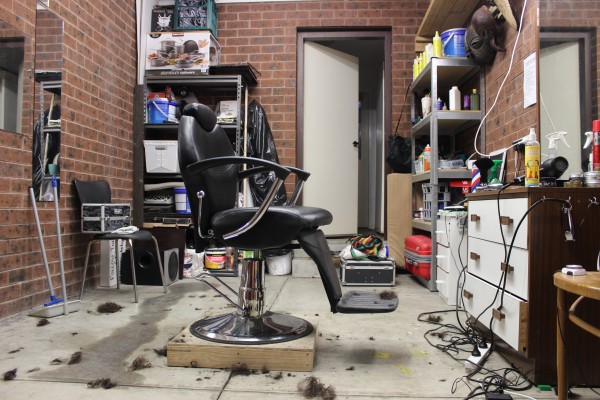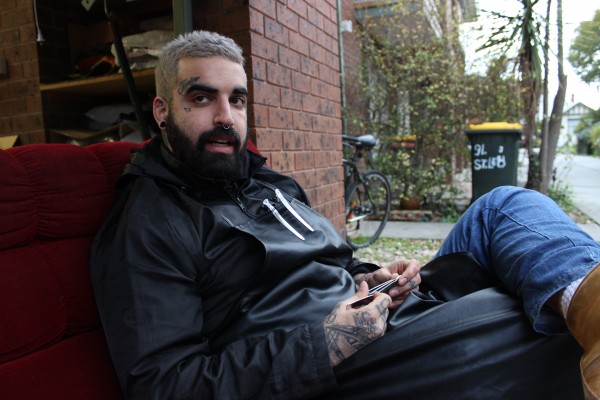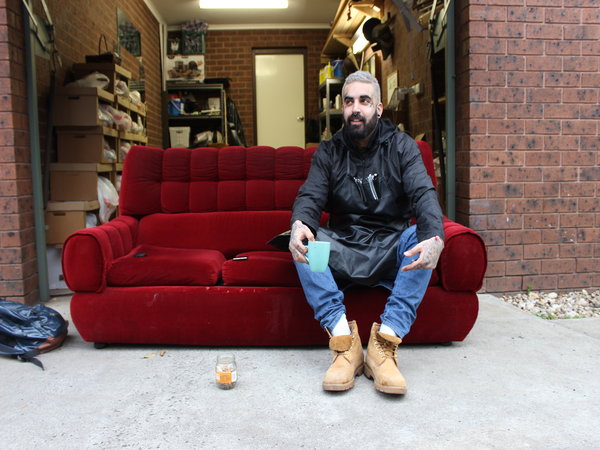Nasir Sobhani’s life is a remarkable tale.
He grew up in Japan but moved around the world. He has studied in Canada, worked with impoverished youth in the jungles of Vanuata, and now lives in Melbourne.
The 26-year-old “Streets Barber”, as he has affectionately become known as, has started up his own initiative cutting hair for those in society who have been left behind.
On his days off, he ventures Melbourne streets cutting the hair of homeless people.
It’s a cold Sunday afternoon in Melbourne’s inner north-west, when Sobhani invites upstart into his home.
He stands a tall intimidating figure, but exudes a welcoming air of kind warmth as he offers coffee and food, a testament to his Baha’i faith.
“Being a Baha’i is the main reason why I’m doing all this,” he tells upstart while making coffee.
We later settle in his garage which he has turned into a makeshift salon.

He tells upstart that the fundamental teaching of Baha’i is oneness; the faith believes in all religions.
“Oneness of god, oneness of religion, oneness of mankind, oneness of people,” he says. “Everything is one no matter what you think it is. Whether you’re Christian, Jew, Muslim or even an atheist, we’re all one.”
Sobhani is a recovering drug addict of four years.
He says he has since found a new and much more fulfilling way to get high.
“Cutting hair is my new drug,” he says.
“When I say that to the guys on the street, there’s a change in their face, they’re like ‘oh wow, it’s cool that you can use something that’s not drugs to get high’.”
Sobhani is sincere and conversation flows easily.
“I hate small talk so I always try and encourage deep stuff,” he says. “Meaningful conversation is the most important thing we can have and that’s another thing the Baha’i faith encourages.”
He carries this philosophy into conversations with clients.
“I have my few questions. How old are you? What’s your background? Were you born here? And we go from there. Rather than what’s on for the weekend? I hate that opening sentence,” he says.
It seems that Sobhani is the streets councillor as well as barber. However, he tells upstart that he benefits from these interactions as much as they do.
“I don’t council them as much as they council me. Mostly because the stuff we get from our conversations together just opens my mind so much,” he says.
“In a way, conversation with these people, it’s like the biggest psychedelic that I’ve ever tried because it really expands my mind.”
Sobhani has recently received a lot of media attention for his work in Melbourne.
“I’m just doing what I love man. It’s really not that big of a deal, I just cut hair, and I love people. I love my faith and I love how much inspiration it gives me helping people,” he says.
“It doesn’t matter if they believe in God or not. As long as they’re human beings man, that’s all we have to do, love each other and respect each other. The world’s not going to change without us appreciating one another.”

When asked what it means to be a Baha’i, Sobhani pauses for a moment before answering.
“It’s easy to say I’m a Baha’i and I believe in God but if you don’t do anything for humanity, if you don’t care for people, then you’re not as much of a Baha’i as someone who doesn’t believe in the faith but does more for people. It’s a religion of deeds, not words,” he says.
Sobhani practices what he preaches by helping his community.
He doesn’t think that a haircut can change somebody’s life but he is adamant that it can be a catalyst for a shift in mindset.
“My theory is if you feel clean, maybe you start thinking clean. That’s how I started this whole idea of Clean Cut Clean Start because with a clean cut I’m hoping to give a clean start on life, simple as that.”
You can follow Sobhani’s Clean Cut Clean Start initiative on Instagram and Facebook.
David Allegretti is a Bachelo r of Journalism student at La Trobe University. Like his page on Facebook or follow him on Twitter: @davidallegretti.
r of Journalism student at La Trobe University. Like his page on Facebook or follow him on Twitter: @davidallegretti.







